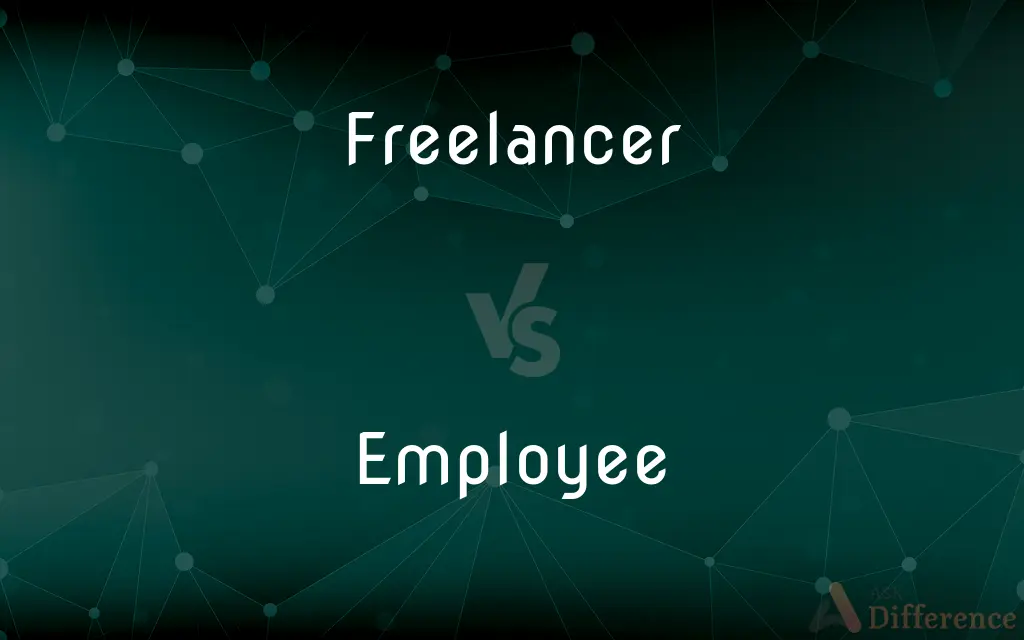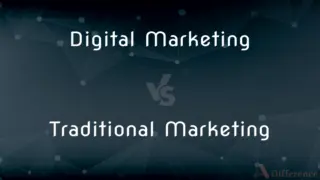Freelancer vs. Employee — What's the Difference?
By Tayyaba Rehman & Fiza Rafique — Published on September 24, 2023
A freelancer is an independent contractor who works on a project-to-project basis, often for multiple clients. An employee works under an employment contract with a single employer and usually receives benefits like health insurance and paid time off.

Difference Between Freelancer and Employee
Table of Contents
ADVERTISEMENT
Key Differences
A freelancer is essentially a self-employed individual who offers services to various clients without being tied down to a single employer. The person has the freedom to choose projects, set rates, and manage their own schedule. In contrast, an employee is hired by a specific company and generally has a more structured work environment, involving a set schedule, salary, and typically, various employment benefits like health insurance.
From a financial perspective, freelancers are responsible for managing their own taxes, as they are considered business owners. This differs markedly from employees, who have taxes, social security, and other deductions automatically withheld from their paychecks by their employers. Freelancers also generally don't receive benefits like health insurance, retirement plans, or paid vacations, which are commonly offered to employees.
Grammatically, "freelancer" is usually a noun ("She is a freelancer"), but can also function as an adjective ("He took on a freelancer role"). "Employee," on the other hand, is primarily used as a noun ("He is an employee"), but can occasionally serve as an adjective in phrases like "employee benefits."
In essence, the key differences between a freelancer and an employee lie in the level of commitment, financial responsibility, and benefits. A freelancer generally has more freedom but less financial security, while an employee sacrifices some level of autonomy for the stability and benefits provided by regular employment.
Comparison Chart
Employment Status
Independent Contractor
Contract with a single employer
ADVERTISEMENT
Financial Responsibility
Manages own taxes
Taxes withheld by employer
Benefits
Generally none
Usually offered
Flexibility
High
Lower
Part of Speech
Noun and sometimes Adjective
Primarily Noun
Compare with Definitions
Freelancer
A person who provides services without long-term commitment to any employer.
Tom is a freelancer who specializes in graphic design.
Employee
A person receiving a regular salary and employment benefits.
As an employee, Mary has access to healthcare benefits.
Freelancer
A self-employed individual working on a project-to-project basis.
As a freelancer, Jane has the flexibility to choose her clients.
Employee
An individual who works under an employment contract for a specific company.
John is an employee at the tech firm.
Freelancer
An independent contractor not tied to a single employer.
Bob enjoys the freedom of being a freelancer.
Employee
An individual whose taxes are managed by the employer.
Tina likes being an employee because her taxes are automatically withheld.
Freelancer
A professional who sets their own rates and schedules.
Being a freelancer allows Sarah to work whenever she wants.
Employee
A worker subject to a structured work environment and schedule.
Being an employee means Mike has to report to work by 9 a.m.
Freelancer
A worker who manages their own taxes and benefits.
As a freelancer, Emily has to take care of her own health insurance.
Employee
A person bound by company policies and regulations.
As an employee, Jack must adhere to the company's code of conduct.
Freelancer
A person who sells services to employers without a long-term commitment to any of them.
Employee
A person who works for another in return for financial or other compensation.
Freelancer
One who freelances
Employee
An individual who provides labor to a company or another person.
One way to encourage your employees to work harder is by giving them incentives.
Employee
One employed by another.
Employee
A worker who is hired to perform a job
Common Curiosities
Do Employees get benefits like health insurance?
Typically, yes, employees often receive benefits like health insurance.
What part of speech is Employee?
Employee is primarily a noun.
What is a Freelancer?
A freelancer is a self-employed individual offering services to various clients.
Do Freelancers have flexible schedules?
Yes, freelancers usually have more flexible schedules compared to employees.
Who is responsible for a Freelancer's taxes?
The freelancer is responsible for managing their own taxes.
Who is responsible for an Employee's taxes?
The employer is responsible for withholding the employee's taxes.
Can a Freelancer work for multiple clients?
Yes, freelancers can work for multiple clients at the same time.
Is an Employee tied to a specific employer?
Yes, employees usually work for a single employer.
Can an Employee also be a Freelancer?
Yes, some people work as employees while freelancing on the side.
Who has more job security, a Freelancer or an Employee?
Typically, employees have more job security due to contracts and employment laws.
What is an Employee?
An employee works under an employment contract for a specific company.
What part of speech is Freelancer?
Freelancer is usually a noun but can also serve as an adjective.
Do Freelancers usually receive benefits?
Generally, no, freelancers do not receive employment benefits.
Is it easier to become a Freelancer or an Employee?
It varies; freelancing can be easier to start but may offer less job security.
Which is better, being a Freelancer or an Employee?
It depends on individual preferences, financial needs, and lifestyle considerations.
Share Your Discovery

Previous Comparison
Digital Marketing vs. Traditional Marketing
Next Comparison
Trust vs. FoundationAuthor Spotlight
Written by
Tayyaba RehmanTayyaba Rehman is a distinguished writer, currently serving as a primary contributor to askdifference.com. As a researcher in semantics and etymology, Tayyaba's passion for the complexity of languages and their distinctions has found a perfect home on the platform. Tayyaba delves into the intricacies of language, distinguishing between commonly confused words and phrases, thereby providing clarity for readers worldwide.
Co-written by
Fiza RafiqueFiza Rafique is a skilled content writer at AskDifference.com, where she meticulously refines and enhances written pieces. Drawing from her vast editorial expertise, Fiza ensures clarity, accuracy, and precision in every article. Passionate about language, she continually seeks to elevate the quality of content for readers worldwide.
















































